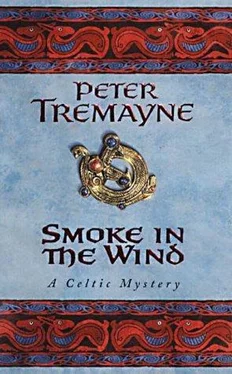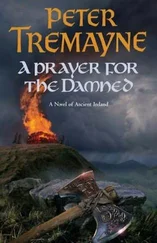Peter Tremayne - Smoke in the Wind
Здесь есть возможность читать онлайн «Peter Tremayne - Smoke in the Wind» весь текст электронной книги совершенно бесплатно (целиком полную версию без сокращений). В некоторых случаях можно слушать аудио, скачать через торрент в формате fb2 и присутствует краткое содержание. Жанр: Исторический детектив, на английском языке. Описание произведения, (предисловие) а так же отзывы посетителей доступны на портале библиотеки ЛибКат.
- Название:Smoke in the Wind
- Автор:
- Жанр:
- Год:неизвестен
- ISBN:нет данных
- Рейтинг книги:5 / 5. Голосов: 1
-
Избранное:Добавить в избранное
- Отзывы:
-
Ваша оценка:
- 100
- 1
- 2
- 3
- 4
- 5
Smoke in the Wind: краткое содержание, описание и аннотация
Предлагаем к чтению аннотацию, описание, краткое содержание или предисловие (зависит от того, что написал сам автор книги «Smoke in the Wind»). Если вы не нашли необходимую информацию о книге — напишите в комментариях, мы постараемся отыскать её.
Smoke in the Wind — читать онлайн бесплатно полную книгу (весь текст) целиком
Ниже представлен текст книги, разбитый по страницам. Система сохранения места последней прочитанной страницы, позволяет с удобством читать онлайн бесплатно книгу «Smoke in the Wind», без необходимости каждый раз заново искать на чём Вы остановились. Поставьте закладку, и сможете в любой момент перейти на страницу, на которой закончили чтение.
Интервал:
Закладка:
Fidelma did not deign to answer. She was examining the lid of the sarcophagus. ‘I think it was constructed to swing back,’ she told him. ‘Do you see where the stone is worn smooth?’
Eadulf nodded reluctantly. He set his candle aside and reached forward with both hands to test the strength of its resistance to his weight. To his astonishment, the lid of the sarcophagus moved easily. He glanced up in satisfaction.
Fidelma nodded quickly.
Eadulf pushed again and the stone swung effortlessly aside.
A smell of decay came immediately to his nostrils. He actually found it less unpleasant than the harsh odours of the decomposing food in the refectory.
Fidelma had moved to the side of the sarcophagus and was peering into the tomb. Eadulf, more nervously, joined her in examining the contents.
Sprawled on the remains of a crumbling skeleton and decayed winding sheet lay a new corpse. A corpse that appeared to have been unceremoniously dumped inside, without ritual, without even the customary shroud. It was the body of a man who, by the state of decomposition, could only have been dead a day or two at the most. He lay on his back, and the dark stains across his chest showed how he had come by his death. He had been stabbed several times.
Eadulf was startled. ‘This is no religious,’ he observed, stating the obvious.
The body was that of a short muscular man with full beard, dark and swarthy and physically unlike any Briton that Fidelma had ever seen. His clothes consisted of a sleeveless leather jerkin, and leather-patched pants which were rolled up to the knees. His legs and feet were bare. He wore bronze and copper bracelets on which were curious patterns and a neckpiece with a symbol like a lightning stroke. Around his waist was a belt from which hung an empty sword scabbard.
Eadulf let out an uncharacteristic whistle.
Fidelma regarded him with faint surprise. Not only was the whistle uncharacteristic but it was not often that Eadulf departed from deferential behaviour in a church.
‘Does the body mean anything to you?’ she asked quickly.
‘Hwicce.’
Fidelma looked bewildered.
‘The symbols on his bracelets indicate he is a warrior of the Hwicce,’ explained Eadulf, pointing.
‘That information leaves me none the wiser, Eadulf. Who-ekka?’ Fidelma tried to pronounce the phonetics.
‘The Hwicce comprise a sub-kingdom of Mercia which borders on the kingdoms of the Britons called Gwent and Dumnonia. The Hwicce are a mixture of Angles and Saxons, a fierce warrior people not yet converted to the true faith, and ruled by their own kings. I last heard that Eanfrith was their ruler. They supported the pagan king of Mercia, Penda, when he was alive. He had no time for Christian virtues.’
‘So, the report received by Gwnda was correct,’ Fidelma said thoughtfully. ‘It does appear that there was a Saxon raid on this place and the community have been taken off as captives.’
Eadulf was leaning forward. He pointed to the man’s necklet with its engraving of a lightning stroke.
‘That is the symbol of Thunor, our pagan god of lightning.’
Fidelma looked down, her brows drawn together as she examined the lightning flash. Her mind was turning over the facts.
‘Here is another mystery. The Saxon warrior is placed in the sarcophagus of the Blessed Padern. He has been stabbed to death. The evidence suggests that he was stabbed in the refectory with a knife being used to carve meat during the meal. If this was done in the course of a Saxon raid, why was he carried here and placed in this sarcophagus? Why didn’t his comrades carry him away?’
Eadulf was frowning. ‘It would be the normal thing to do,’ he agreed. ‘The Hwicce, especially, do not believe in letting their dead fall into the hands of their enemies if they can avoid it. He should have been removed and buried at sea. The Hwicce are still revered by the Saxon kingdoms.’
Fidelma examined him curiously. ‘Why so?’
‘They still follow the old ways. The dark paths of Frige and Tiw are beset with sacrifice and darkness.’
Fidelma was scornful. ‘Nothing in that is worthy of reverence.’
‘It might be because they are frontiersmen, still carving their kingdom out of the territory of the Britons who were most hostile to the advance of the Angles and Saxons. They have retained their belief in the original gods of the people. Their kings still claim that they are descended from Woden, the chief of the gods.’ Eadulf hesitated.
‘And?’ Fidelma was not encouraging.
‘In spite of the coming of the Faith, all our kings from the land of the West Saxons to Bernica still claim such a lineal descent from the god Woden.’
Fidelma pursed her lips cynically. ‘At least my people do not have to claim they descend from gods and goddesses to seek leadership and obedience.’
Eadulf flushed slightly. While Fidelma was logically right, he still felt that criticism of his culture was implied. He decided to deflect the subject.
‘Why would the Hwicce raid this godforsaken coast? We are nearly two hundred kilometres from their kingdom. Why would they raid here? Why leave the place so immaculate and why leave one of their number in a Christian tomb?’
‘That is something which we must discover. Let us leave our pagan friend in the sarcophagus for the time being. Our next step is to search for more evidence before we journey to — what was the name of the place where the young boy, Dewi, reported the Saxons had killed some of the brothers?’
‘Llanferran.’
‘That’s right. Llanferran.’
Eadulf gave a deep sigh. ‘None of this even begins to make sense to me. It is one unreasonable alternative facing another.’
‘When you consider all the possibilities, it is the most reasonable explanation that provides an answer,’ Fidelma assured him. ‘Most things are illogical until you have the information which explains them. Come, let us see what else we can discover in this place.’
Fidelma helped Eadulf return the lid to its normal position. She was about to lead the way out of the chapel when something else caught her eye and she paused, staring intently at the altar.
‘We almost missed that,’ she said, nodding towards it.
Eadulf looked at the bare altar and frowned. ‘Missed what?’ he demanded.
Fidelma sighed impatiently. ‘Come, you should know better. Look, observe.’
Eadulf turned back to the altar. ‘There is nothing there,’ he protested. ‘What am I looking at?’
‘Nothing,’ said Fidelma. ‘That is precisely the matter.’
Eadulf was about to question her further when the realisation finally came to him. ‘There is no crucifix there. No altar candles; no icons.’
‘Precisely. Just as we may expect after a raid, the valuables are gone.’
As they turned to leave, just behind the chapel door they discovered another curious object. It was the figure of a man made from twists of straw bound together with pieces of string.
Fidelma was examining it with a thoughtful expression when Eadulf interrupted.
‘I can see no reason why the Hwicce would raid this place,’ he commented. ‘Surely the missing icons and treasures here would not constitute great wealth?’
‘Your people keep slaves, don’t you? Perhaps the incentive lay in the sale of the community.’
They found their way to the dormitorium and conducted a more thorough examination. It took them but a few moments, searching the sleeping quarters, to ascertain that nothing was missing from the personal belongings of the brothers. Toilet articles, a breviary and other small items remained at each separate bed.
In the chamber which was clearly that of the Father Superior, Fidelma’s sharp eyes noticed that one small, iron-bound box lay discarded in an alcove. It was the sort of box that one might expect to find valuables in, but it was open and empty. Nor, as she pointed out, was there a crucifix in the room. The chamber of a Father Superior would usually contain a fairly valuable cross. That one had hung in the room until recently was evident by the dusty shadow marks outlining its position on the wall.
Читать дальшеИнтервал:
Закладка:
Похожие книги на «Smoke in the Wind»
Представляем Вашему вниманию похожие книги на «Smoke in the Wind» списком для выбора. Мы отобрали схожую по названию и смыслу литературу в надежде предоставить читателям больше вариантов отыскать новые, интересные, ещё непрочитанные произведения.
Обсуждение, отзывы о книге «Smoke in the Wind» и просто собственные мнения читателей. Оставьте ваши комментарии, напишите, что Вы думаете о произведении, его смысле или главных героях. Укажите что конкретно понравилось, а что нет, и почему Вы так считаете.












